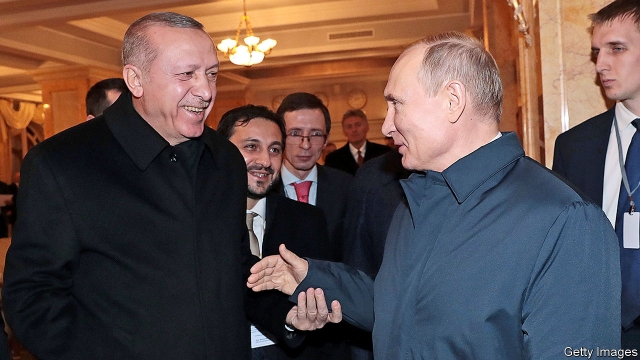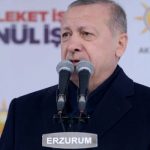Come for uncensored news, and stay for the pro-Kremlin spin
A wounded jihadist commander is spotted receiving treatment in a Turkish hospital near the border with Syria. A court awards compensation to a Kurdish villager beaten senseless by security officials. A writer accuses the government of fearmongering after a prosecutor demands life sentences for 16 people involved in protests. These are the kind of stories only a few media outlets in Turkey, the world’s biggest jailer of journalists, dare to cover. It may come as a surprise that one of them is a news organisation founded and funded by Russia’s government.
In much of Europe and America Sputnik has a richly earned reputation as a Kremlin mouthpiece. Facebook recently accused the group’s employees of setting up dozens of fake accounts on its platform designed to spread misinformation. President Emmanuel Macron has referred to Sputnik as “an agent of influence and propaganda” in France. Sputnik has played a similar role in Turkey, where it has enthusiastically supported Russian efforts to deepen the country’s estrangement from its Western allies. But the agency has also won over hundreds of thousands of readers and listeners by providing an increasingly scarce product—uncensored news about Turkey in Turkish.
The service, which features a website and radio channel, was launched in Turkey in late 2014. A year later Turkey’s airforce shot down a Russian warplane which had entered its airspace after a run over northern Syria. Russia responded with sanctions and demanded a formal apology. Sputnik responded by airing thinly sourced Russian claims about Islamic State oil sales to Turkish officials, including members of Mr Erdogan’s family. Some Turkish news outlets picked up the story. In the spring of 2016 Turkey blocked access from Turkish internet providers to Sputnik’s website and deported its news manager. Later the same year, as the Russian sanctions started to bite, Mr Erdogan relented, expressed regret for the downed plane and reconciled with his counterpart, Vladimir Putin.
Later in 2016, Mr Erdogan travelled to St Petersburg, where he thanked Mr Putin for condemning a coup attempt against Turkey’s government, agreed to bridge differences over the war in Syria, revived a number of joint energy projects, including an undersea gas pipeline from Russia, and expressed interest in purchasing a Russian weapons system. Mr Putin won one other concession. The day before Mr Erdogan’s visit, Turkey unblocked Sputnik.
Since then Sputnik has drummed up support for the rapprochement between Turkey and Russia. Its website teems with stories hailing Turkey’s purchase of Russia’s s-400 missile system, which nato and in particular America opposes, as a sign of the country’s increasing independence from the Western alliance. On issues like the wars in Ukraine and Syria and the turmoil in Venezuela, Sputnik regularly channels the voice of its Russian paymasters. A study published last year by the rand Corporation concluded the news agency was part and parcel of a Kremlin strategy to “foment suspicion” between Turkey and its natopartners and to enlist the country’s support for Russia’s policies. It is operating on fertile ground. According to a series of polls by Kadir Has University, the share of Turks who identified Russia as a threat to their country dropped from 34.9% in 2016 to 12.4% last year. Those who saw America as such soared from 44.1% to 60.2%. That looks like a good return for Mr Putin on a limited investment.
But Sputnik has also continued to be a thorn in Mr Erdogan’s side by flouting the rules imposed on Turkey’s leading news outlets. (Analysts and media-rights groups estimate that about 90% of newspapers in circulation are in the hands of businessmen close to the government.) The service recently published excerpts from an interview with Selahattin Demirtas, a Kurdish political leader imprisoned since late 2016. Most outlets are effectively banned from reporting on Mr Demirtas or his movement. Critics reckon that the website wants Turks, especially those who are critical of the Erdogan government, to come for decent coverage of Turkish politics and to stay for the pro-Kremlin spin.
Sputnik’s journalists say they are simply providing an alternative to the bland, toothless coverage offered by domestic news outlets. Whatever Sputnik is doing seems to be working. Its service in Turkey now boasts over twice as many Twitter followers (609,000 at last count) as its global service has.
In the kingdom of the bland
Along with the bbc and Deutsche Welle, which also run Turkish-language services, Sputnik has turned into a magnet for unemployed Turkish reporters. Today, the group boasts some of the country’s best and most popular journalists. Ahu Ozyurt, a veteran television anchor who joined the service last year, says she was pleasantly surprised to discover that she could invite whomever she wanted to appear on her radio programme. Most of the big news channels blacklist experts overly critical of the Erdogan government. “The mainstream in Turkey is so bad”, says Ms Ozyurt, “that just being able to do basic, orthodox journalism feels extraordinary.” Those responsible for the sorry state of the Turkish media, starting with Mr Erdogan, ought to take notice. When your newspapers make a group financed by the Kremlin look like a beacon of press freedom, something has gone seriously wrong.



